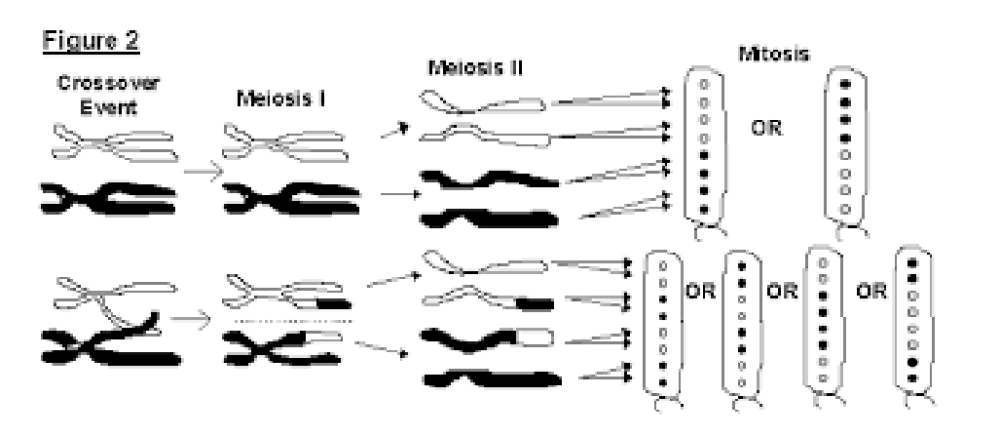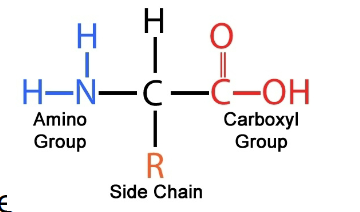What are zea mays?
corn
What is a bacterial colony?
A group of bacteria that came from a single bacteria. (Then they would be genetically similar)
What is the pattern of inheritance?
where certain traits were dominant and recessive, with dominant traits masking the effects of recessive genes. (created by gregor mendel)
What is the parental generation?
consist of two true bred specimen so that their alleles are known and will be homozygous
What was the first filial generation?
Offspring of the P generation, consisting of 100% heterozygous individuals, thus containing both alleles from parents and 100% exhibiting the dominant traits
What was the second filial generation?
Offspring of F1 generation, will have an even amount of homozygous and heterozygous individuals but 75% will exhibit the dominant trait
What are punnett squares?
A tool that allows us to predict the outcomes of certain crosses. Alleles from both parents being crossed are represented and combined to create a new set of alleles.
What are dihybrid crosses?
allow us to predict the chances of two alleles being inherited simultaneously.
What is probability?
The likelihood of something happening or being the case
What is binomial expansion?
Allows us calculate probability without having to think of
every
sequence in which events occur. The formula is (a+b)^n
What is the chi-squared test?
Allows us to calculate deviations from observed and
expected
numbers to determine if this is due to chance or if it is
statistically significant. (helps use find the probability value)
greater than (.05) 5% is insignificant
less than (.05) 5% is significant
What is degree's of freedom?
the number of categories being measured (in this case phenotypes) minus one
What are genetically modified organisms(GMOs)? List examples
Any animal, plant, or microbe that has had their DNA altered using genetic engineering. We are around GMOs everyday, some can be helpful, some can be harmful.
Wild carrots, chickens, hybrid dogs (doodles), E. coli k-12
Single gene testing?
Looking at singular genes
What are genetic testing panels?
Looking at multiple genes
What is genetic testing?
Any test that is capable of identifying changes to DNA
What is a pedigree?
Shows relationships between individuals as well as
affected
family members.
What is a proband?
The individual who serves as the starting point for genetic study for a family.
What is a consultand?
The patient seeking information
What is a carcinogen?
Any chemical capable of inducing cancer
What is cancer?
A disease in which some of the body’s cells grow uncontrollably and spread to other parts of the body. (Can happen in any type of cells)
What are benign tumors?
non-cancerous cells that don't harm us
What are malignant tumors?
Cancerous and spread through metastasis
What is Hereditary Colon Cancer(HNPCC)?
A type of cancer that is caused by 4 types of mutated genes. MLH1, MSH2, MSH6, PMS2
What is lynch syndrome?
Also known as HNPCC and is a type of inheritable cancer
What is gel electrophoresis?
Method of separating DNA, RNA, or even proteins by size and charge
What are restriction enzymes?
proteins produced by bacteria that cuts DNA at specific sites. (Restriction endonucleases)
What are palindromic sequences?

nucleic acid sequence in a double-stranded DNA or RNA molecule where both strands are identical
What is the serial dilution formula?
C1V1=C2V2
What is the cell cycle?
The cell cycle is a process of growth and division for cells
What is mitosis?
Creates two daughter cells from a single parent cell. also means thread for its threadlike appearance.
What is meiosis and what does it create at the end?
Reduces the number of chromosomes from 2n to n in a cell to create gametes (reproductive cells)
The end goal is four daughter cells with a variety of chromosomes to allow for genetic diversity in offspring
What is crossing over and when does it occur?
Occurs during prophase I and allows for genetic diversity in the world and is the reason why you are not 100% like your parents or siblings
What is the chiasmata?
Where the homologous chromosomes cross over and genetic material is exchanged
What is autosomes?
non-sex related chromosomes
What is Topoisomerase?
alleviates any tension that is created by the unwinding of the double helix of DNA
What is Endonucleases?
It looks for specific areas in the DNA to cut. It is capable of making double strand breaks
What is Exonucleases?
It removes the areas that the endonucleases cut through
What is DNA Ligase?
It seals breaks in the DNA, allowing for the integration of the new DNA onto the existing strand
What is sex linkage?
Some genes are located on sex chromosomes, meaning
some
individuals are more likely to express a trait (or disorder)
than others
What are the male and female chromosmes?
male - XY
female - XX
What are some examples of sex linked traits?
Red-green color blindness, Hemophilia, Male pattern baldness, fragile X syndrome
What is phylum Ascomycota?
Most diverse fungal phylum
What is the ascus?
The defining feature is a microscopic sexual structure. Ascospores are formed there
What is Plasmogamy?
The fusion of two hyphae together
What is the Dikaryotic stage?
Cells have two haploid nuclei
What is the karyogamy stage?
Nuclei fuse together and create one diploid nucleus
What happens in meiosis in ascomycetes?
Results in four cells haploid ascospores
What happens in mitosis in ascomycetes?
Cells divide to form eight ascospores in an ascus
What happens in the dispersal stage?
Mature ascus release the ascospores to start a new mycelium
What is sordoria fimicola?

It is a microscopic ascomycete thats life cycle is usually 1 to 2 weeks
What is gene linkage?
The tendency of genes that are located close to each other
on
the same chromosome to be inherited together during meiosis
What is genetic mapping?
When 2 traits are regularly inherited together and we can determined that those genes are close together on a chromosome.
What is the recombination frequency?
Calculating the frequency of recombination events between genes.
total recombination's/total offspring's) x 100
What is the central dogma of biology?
Theory that describes the flow of genetic information from DNA to RNA to Proteins
What is transcription?
Making a copy of RNA from a genes DNA sequence. Also produces mRNA from segments of DNA to produce proteins
What is translation?
The strand of mRNA is decoded to produce a particular sequence of amino acids (proteins)
What are peptide chains?

chains of amino acids that have the same basic structure. (amino acid, carboxy group, and a side chain)
What is protein structure?
Caused by the interaction of amino acids in the linear
sequence.
There are four levels of protein structure.
What is the primary protein structure?
The linear sequence of amino acids. A straight chain often called a polypeptide
What is the secondary protein structure?
Folding patterns caused by hydrogen bonds between the polypeptide backbone. Formation of alpha helices and beta sheets
What is the tertiary protein structure?
Interactions between amino acid side chains causes a 3D structure to begin forming. These can be ionic bonds, hydrogen bonds, Van der Waals interactions, and disulfide bonds
What is the quaternary protein structure?
Multiple polypeptides arrange to create a protein complex
What is sickle cell anemia?
A codominant genetic disorder caused by a single
nucleotide
missense mutation. It aroused by natural selection
What is codominance?
If an individual is
heterozygous one allele does not mask the
other, they are both
expressed at the same time
What happens in chromosome 11?
The sixth nucleotide in the sequence changes from adenine (A)
to
thymine (T), changing the amino acid from glutamate/glutamic acid to
valine. This cause the shape of the hemoglobin beta gene to change shape
What are centrosomes?
where the tubules or spindle comes from
What are sister chromatids?
Identical copies of a chromosome formed by DNA replication
What is a centromere?
The part where sister chromatids are joined together
What is cohesin?
Cohesin forms rings that hold the sister chromatids together in prophase
What is condensin?
Condensin forms rings that coil the chromosomes into
highly
compact forms in prophase
What are kinetochores?
A complex of proteins positioned at the centromere. microtubules attach to the kinetochores to connect to the chromosomes.
What are interpolar microtubules?
They extend from the spindle pole across the equator, almost to the opposite spindle pole
What are astral microtubules?
They extend from the spindle pole to the cell membrane
What is anaphase a?
The kinetochore microtubules shorten and draw the chromosomes toward the spindle poles.
What is anaphase b?
The astral microtubules that are anchored to the cell membrane pull
the poles further apart and the interpolar microtubules slide past
each other, exerting additional pull
on the chromosomes
What is the cleavage furrow?
The cell membrane pinches in at the cell equator. The position of the
furrow depends on the position of the astral and
interpolar
microtubules during anaphase.
What are sex chromosomes?
They determine whether an individual is male or female. XY and XX
What is a zygote?
Egg and sperm join to make this and they develop into an offspring
What is recombination?
Homologous chromosomes pair up and exchange stretches of DNA which makes new allele combinations
true or false. Unlinked genes, whether on the same or different chromosomes, are inherited separately 50% of the time.
true